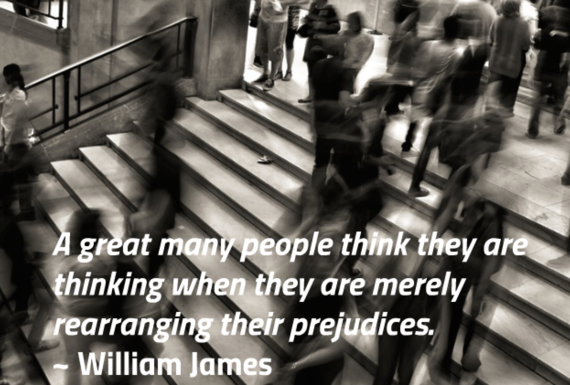There is a lot in the news right now about race, diversity, and inclusivity -- and I believe that this is a very good thing for our society to wrestle with openly. Before I go any further, I want to acknowledge that I am a white, college-educated, heterosexual male. Based on my race, socio-economic class, sexual orientation, and gender, I belong to the most privileged class in modern American culture. It would be silly not to acknowledge that all of this effects my perspective of the world.
Here is one example of how this has played out in my life. While traveling to Mexico on a service trip with high school students, I had the opportunity to listen to an architect from Tijuana who spoke passionately about the art and design movement in his city. Until that point, I believed that everyone living in Mexico would rather live in the United States. But, I didn't know I had this belief this until I heard this man eloquently express his admiration for his culture. In that moment, I realized that I had been carrying around a bias that I was utterly unaware of. This humbling realization was immediately followed by the creeping understanding that this bias must have shaped my behavior in ways that affected others.
The science is pretty clear that when it comes to race -- we have a preference for "same." This is known as "own race bias." This phenomenon is well-researched and documented. So, we can stop endlessly trying to identify who is and who is not racially biased -- we all are. Own race bias has been detected in infants as early as three months of age. The inclination for own race bias appears to be wired into our brains from a time when survival was related to identifying who was part of our tribe and who was a potential threat. Depending on the environment we are raised in, this inclination can be strengthened or tempered. It is important to note that biases do not need to be taught directly, they can be passed on silently.
All bias is not created equal. The biases and resulting behavior of people with power and privilege are just flat out more impactful. The power to include or exclude is not distributed equally in our society. But people in power are often unaware that this is the case -- we like to believe that we are solely responsible for everything we have. It can be challenging to acknowledge that, by chance, I was born into a group that currently has more systemic power than others. Yup, I am the beneficiary of an unconscious conspiracy. This means that the greatest responsibility for making a more inclusive society rests with those who are least likely to be aware of how exclusive our society currently is.
The good news is that having a bias, and acting on that bias are not the same thing. An incredibly powerful skill of human beings is that we can recognize our biases and transcend them. Self-defensiveness does not uncover biases -- self-awareness does. Being aware of bias actually reduces bias. We have the ability to be vulnerable, acknowledge our exclusive perspectives, and behave in a way that is inclusive. Yes, each of us has the ability to change the way we perceive and treat "others."
Practicing mindfulness is a great start. Mindfulness is often sold as a relaxation technique, but it is actually the practice of bringing your attention to whatever is happening in the present moment. Skillfully using your attention to create greater situational and self-awareness is a powerful way to reduce the impact of bias. We are more likely to include others and help others when we are being mindful. Intentionally looking around and looking within while taking an accepting and curious posture toward life is an exceptional practice for personal well-being and for the overall well-being of the world.
We can practice compassion for the fact that to be human is to be biased. We can accept that each of us has hidden biases, and we can be curious about what they might be. We can listen to others and acknowledge their experiences. We can actively work to include "others" in this grand experiment that we call civil society. Of course, we also have the option of practicing denial, defensiveness, blame, and exclusivity. I guess it just depends on the kind of society that we are trying to create. Society is a result of collective individual practice, and what we practice at any given moment is a choice. Knowing this, what will we practice right now?
Dave Mochel is a coach and consultant who helps individuals and organizations increase their well-being and effectiveness by teaching the practices and principles for living and working with awareness, compassion, and purpose.
You can reach Dave at www.appliedattention.com
